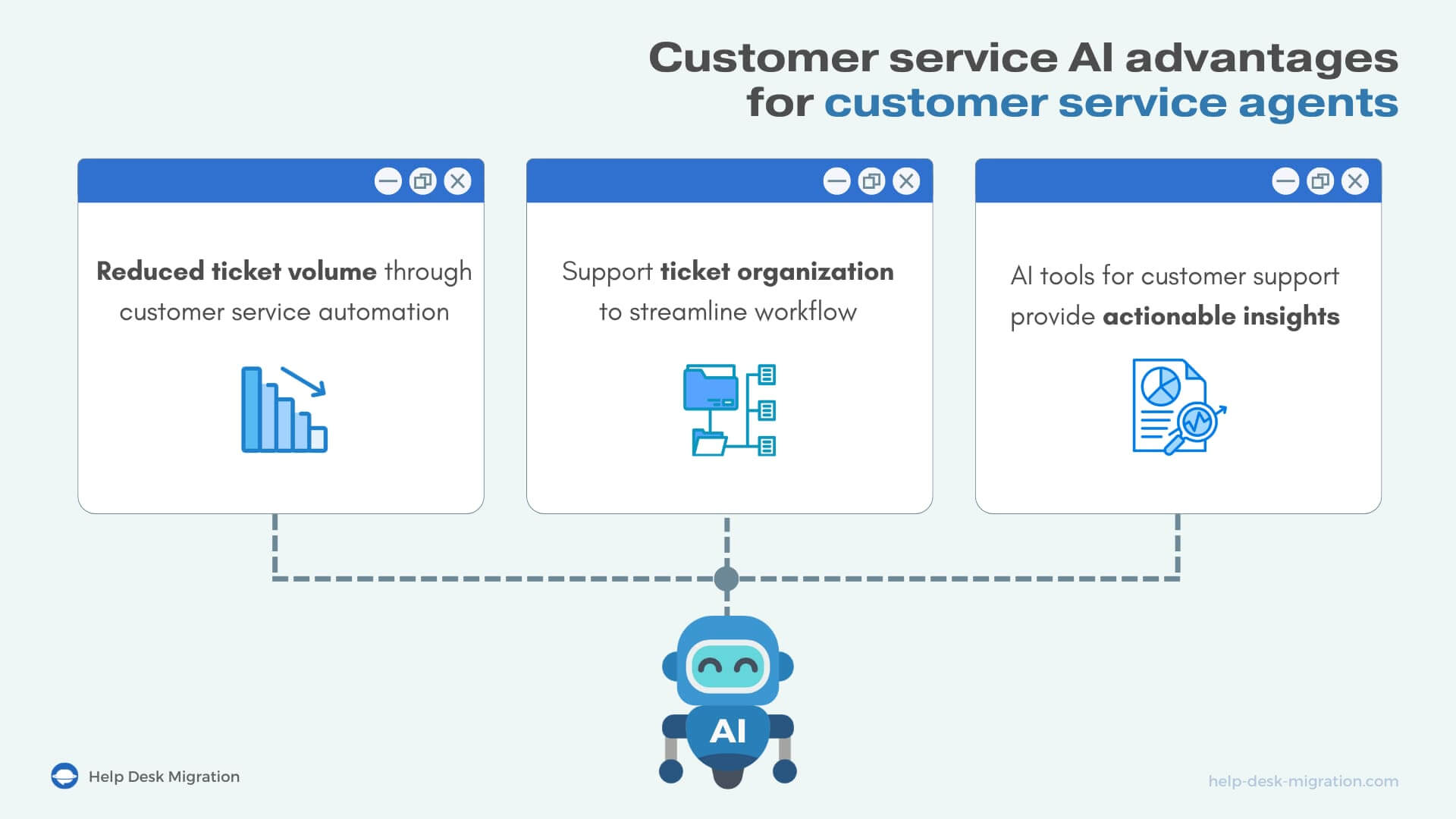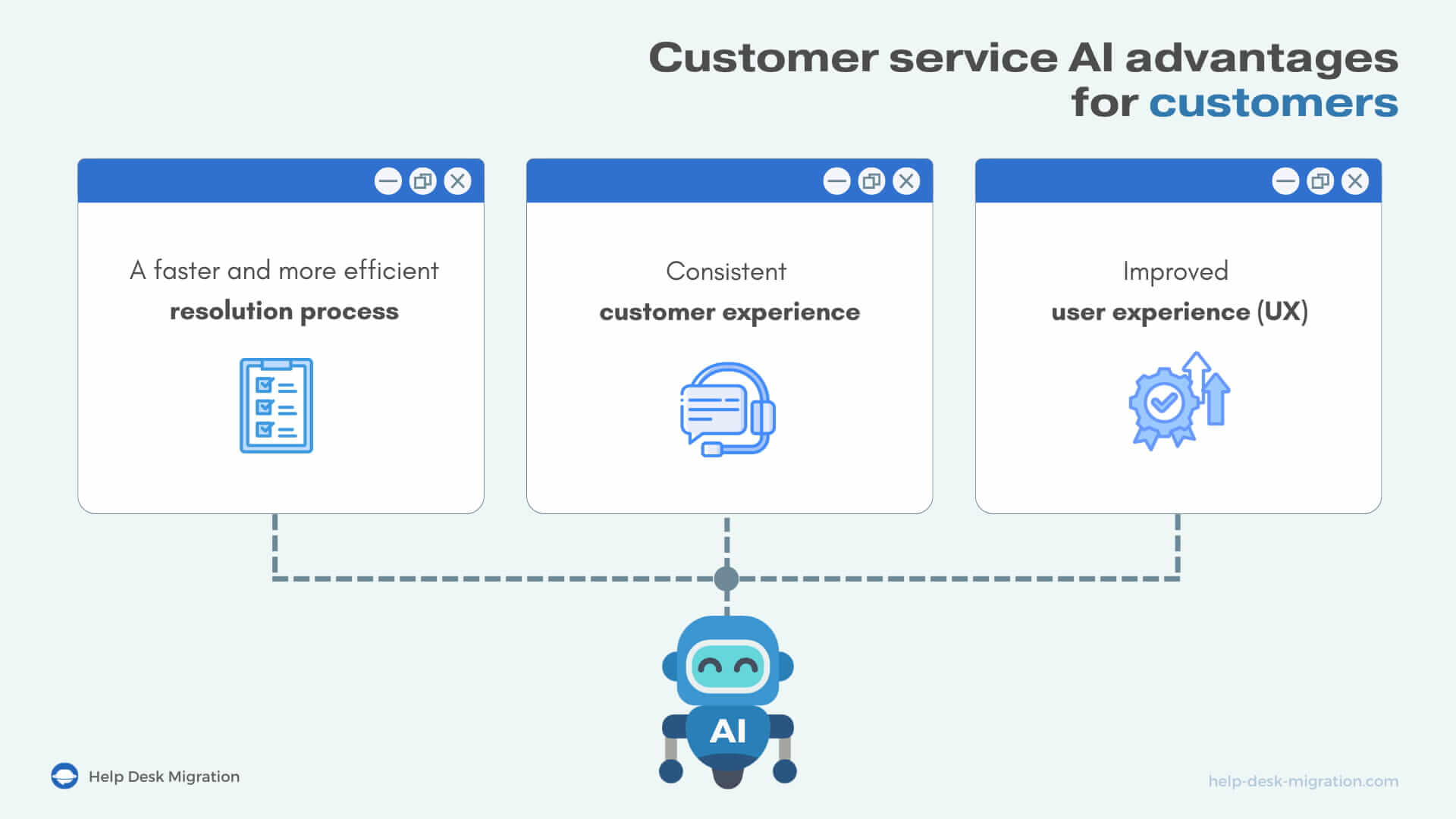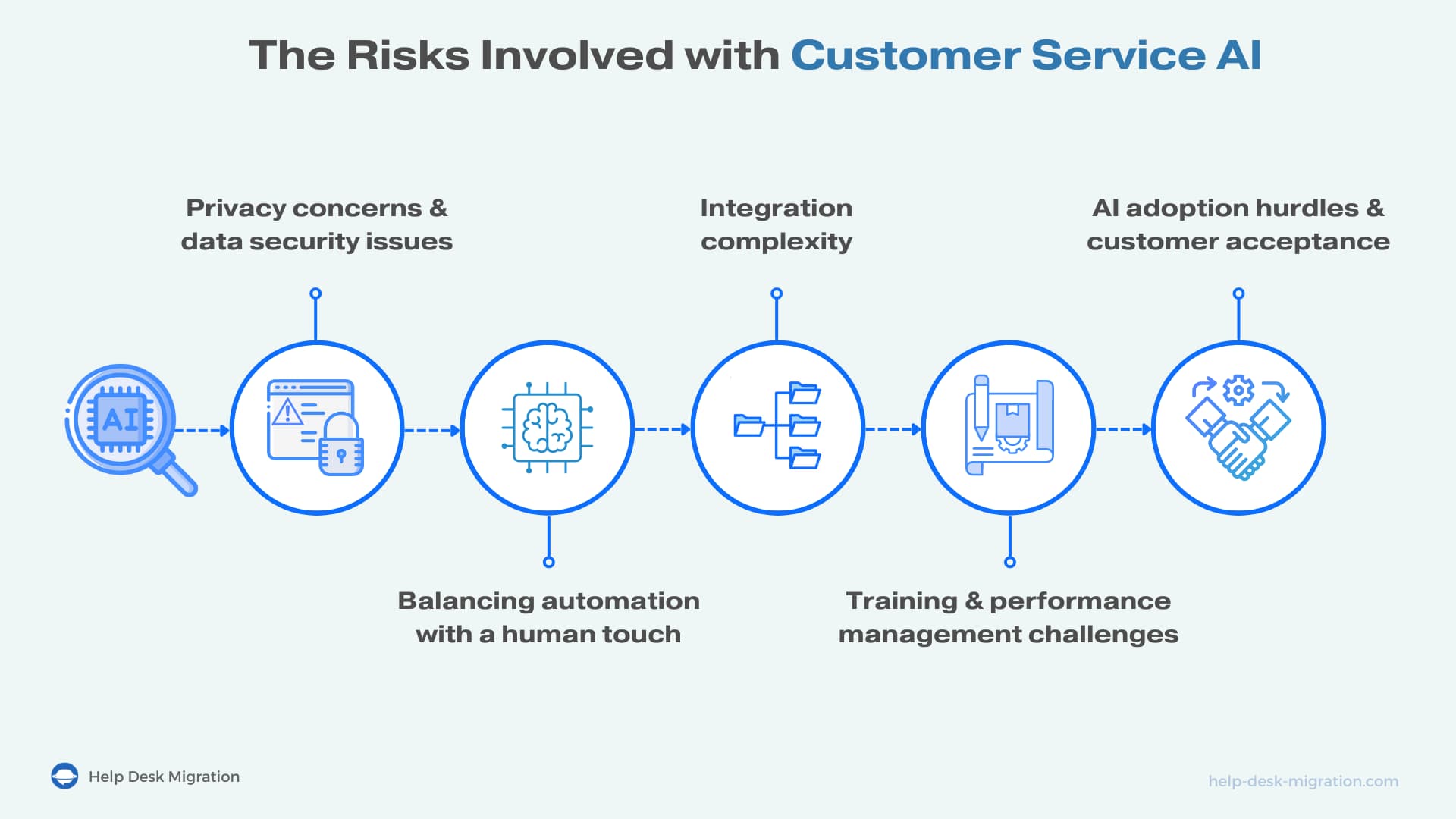Netflix uses AI for smart recommendations, Decathlon reduced customer support costs by automating 65% of inquiries thanks to a digital assistant, and it's almost impossible to find a website without a chatbot bubble in the corner. With AI driving significant improvements, it’s no surprise that businesses across industries are adopting this technology to automate workflows, personalize customer experience, and cut support costs.
But how exactly can AI help customer service, and what are some examples of AI in customer service? You’ll discover all of this in this article.
What Is Customer Service AI?
Customer service AI is not a specific software. Rather, it’s an approach that uses advanced technologies to improve various aspects of customer service operations, such as automating responses to common questions, assigning tickets based on urgency, speeding up resolutions, personalizing interactions, and freeing up support agents to focus on more complex issues.
To achieve these improvements, customer service AI utilizes a combination of technologies like machine learning (ML), natural language processing (NLP), and chatbots. But how exactly do these technologies contribute to customer support?
Machine learning
Machine learning (ML) enables systems to learn from data and make accurate predictions based on patterns found in that data. In customer support, ML analyzes customer behavior and previous interactions to anticipate needs, foresee potential issues, and recommend solutions. It also processes vast amounts of information to uncover trends, optimize operations, and provide deeper insights into customer preferences.
Additionally, machine learning solutions can prioritize tasks for agents, ensuring urgent issues are addressed swiftly, further improving service efficiency.
Natural language processing (NLP)
Natural language processing (NLP) allows AI systems to process text or speech, recognize communication patterns, and provide the appropriate response. So, essentially, this technology helps AI understand humans.
In customer support, NLP is crucial for providing more accurate, personalized, and natural—human-like—assistance. It can analyze the tone and emotions of a customer, understand the context of a conversation, and support real-time language translation, making interactions easier and more pleasant.
Chatbots
A chatbot is an AI-powered program that simulates conversations with users, typically through text or voice. And it’s become a really popular tool for improving customer service processes.
By providing 24/7 availability, it ensures customers can get assistance at any time, regardless of time zones or business hours. A single chatbot can handle hundreds or even thousands of requests simultaneously, drastically reducing response times. With chatbots, support teams can focus on more complex queries, leaving the chatbot to handle all the simple FAQs.
So, the use of AI in customer service involves various support tools and technologies. We’ve already discussed how some of these technologies enhance customer support processes, but now we’d like to dive a little deeper into the topic to highlight the specific benefits of customer service AI.
Benefits of Customer Service AI
AI can be highly beneficial for customer support teams, as well as customers themselves. For example, according to HubSpot, customer service professionals using chatbots save around 2 hours and 20 minutes per day. Similarly, SurveyMonkey reports that while 90% of people still prefer human customer service over chatbots, 41% of consumers appreciate chatbots' better availability, and 37% value their faster issue resolution.
Below, we’ve collected the most common benefits that customer service agents and customers experience when a company implements AI in customer support.
Customer service AI advantages for customer service agents

Reduced ticket volume through customer service automation
As we mentioned earlier, AI chatbots can respond to less complex inquiries such as FAQs, password resets, or order status updates. This, in turn, reduces the volume of tickets that customer support service reps need to handle, leaving them with only the most difficult cases.
Support ticket organization to streamline workflow
AI tools can automatically categorize, prioritize, and assign tickets based on urgency, type of issue, or customer profile to the right agent. This streamlines the workflow, reduces response times, and ensures that critical issues are handled efficiently by the most appropriate team members.
AI tools for customer support provide actionable insights
Customer support agents can make more informed decisions and provide better service when they have deep insights into customer behavior. AI-driven analytics is a valuable tool in this process, sifting through vast amounts of customer data to identify trends, behaviors, and pain points.
Customer service AI advantages for customers

A faster and more efficient resolution process
The ability of AI chatbots to resolve simple queries immediately, and to route people to the right agent for more complex issues, also benefits customers. This ensures their needs are met faster and more efficiently.
Consistent customer experience
AI learns from the company data, guidelines, and values you provide, as well as interactions with humans. This enables it to maintain consistently high-quality assistance and helps build customer trust by ensuring customers always receive a reliable level of service.
Improved user experience (UX)
Based on customer behavior and past interactions, AI can better understand the context and needs of each user. It can provide relevant suggestions, assist in a way that aligns with the customer's preferences, and improve the relevance and accuracy of its responses.
So, by adopting AI in customer support, companies can satisfy their needs, their teams, and their customers. However, to get the most out of AI tools, it’s important to understand the capabilities of AI for customer support and how to use it effectively.
How AI Is Used in Customer Service
Despite the fears of some customer support representatives, AI is not here to replace them. On the contrary, artificial intelligence in customer service is a complementary technology that helps teams resolve customer issues faster, more personally, and in a more systematic way.
AI supports customer service agents in various aspects of their work, including:
- Agent support: AI offers real-time insights and suggested responses to help agents work more quickly and accurately.
- Self-support: AI empowers customers to resolve simple issues through chatbots and virtual assistants, freeing customer support agents from handling hundreds of repetitive, easy-to-manage inquiries.
- Customer insights: AI analyzes customer behavior and interactions to help agents personalize responses and anticipate needs.
- Process improvement: AI automates routine tasks like ticket sorting and prioritization, allowing support agents to focus on more complex issues.
Now, we’d like to explore more specific AI applications in customer service so you can better understand how adopting AI can improve your company’s processes, and how to choose your AI customer service solution.
Examples of AI in customer service
Instant query resolution
So, we start with the most obvious one—chatbots. As you already know, these are mostly used to answer common questions such as account details, order statuses, etc. For example, e-commerce companies often implement chatbots on their websites to assist customers with product recommendations and real-time help, reducing the load on human agents and providing quick responses.
Guiding customer self-help
Self-service chatbots don’t just answer common questions. These programs can guide customers through some processes without involving a human agent. For example, ordering, returns, subscriptions, etc. Many online retail companies use self-service chatbots that allow customers to independently handle tasks such as checking the status of an order, initiating returns, or updating account information.
Support ticket organization
You can automate the categorization and prioritization of support tickets using AI. Using customer support platforms with such features, companies, for example, sort high-priority technical issues to be handled immediately by specialized agents while routing lower-priority requests, like billing inquiries, to automated solutions or less urgent queues.
Sentiment analysis
AI can understand people's emotions by analyzing text or speech using NLP, identifying words and patterns that indicate whether the emotion is positive, negative, or neutral. Businesses can use sentiment analysis to detect when a customer is unhappy and escalate the case to a senior agent to prevent churn.
Competitor review analysis
Using NLP and ML, companies can analyze customer reviews of their competitors across various platforms like G2, DoVersus, or Trustpilot. This can help identify that, for example, customers frequently complain about poor user support or praise ease of use, and the company can then focus on improving their customer support based on the insights gained.
Multilingual support
Thanks to NLP and its ability to translate and understand different languages, companies can expand globally and offer support to their customers in their native languages.
Smart routing
This is related to support ticket organization but focuses more on how AI can identify the right support agent for a ticket based on its category and complexity. For example, AI can analyze the issue and route a customer’s query about a technical claim to a specialized agent, while simpler policy inquiries are directed to general support staff.
Wait time monitoring
AI-powered systems can predict wait times based on the current load, the number of support agents, and the average resolution time, helping businesses manage customer expectations. For instance, a healthcare provider might use AI to estimate how long a patient will need to wait for an appointment or consultation and provide real-time updates to keep the patient informed.
Agent action suggestions
Based on customer data and historical success rates, AI systems can suggest the best course of action to customer service reps. For example, a company can use AI to recommend troubleshooting actions to agents based on past successful resolutions.
AI-generated responses
AI tools can help customer support reps generate responses to customers based on their inquiries and previous interactions with the company. This allows agents to approve and send the responses with minimal edits, speeding up response times.
So, we can see that AI can be used in customer support in various ways, making it an incredibly valuable technology. But does using it pose any challenges?
The Risks Involved with Customer Service AI
We can see that AI offers many benefits to support teams, like enhancing productivity through customer service automation and improving the customer experience with better availability, deep analytics, and personalization. However, businesses may face certain challenges when implementing AI in their processes, and addressing these challenges is essential for the effective use of AI.
Here are some of the most common risks and challenges that come up when adopting artificial intelligence.

Privacy concerns and data security issues
AI processes a lot of private data from customers, which can raise privacy concerns, so businesses need to implement strong data encryption and comply with regulations like GDPR and CCPA.
Balancing customer service automation with a human touch
Overusing AI, especially for human interactions, may lead to poor customer experience. That’s why it’s important to clearly understand which queries are easily resolved by AI and which ones need a human touch.
Integration complexity, particularly in customer service operations
Integrating AI with existing systems can be quite a challenge, often due to the complexity of transferring vast amounts of data while ensuring that AI tools integrate seamlessly with new platforms.
Using a specialized service like Help Desk Migration can simplify this process by securely transferring all customer data, ticket history, and other relevant information from one platform to another, AI-powered one.
Training and performance management challenges for support agents
Customer service agents may face difficulties adopting AI as it introduces new approaches and changes to their workflow. Providing training and clear guidelines to your support team is essential.
AI adoption hurdles and customer acceptance
Some customers may be uncomfortable with the idea of communicating with AI or concerned about their data privacy. To address this challenge, businesses should offer customers the option to interact with a human agent and clearly explain how their data will be used and protected.
Conclusion: The Future of Customer Service is AI
So, we can confidently say that AI is revolutionizing customer service. From chatbots and ticket organization to sentiment analysis and smart routing, AI's applications in customer service are diverse and beneficial both for customers and customer service reps.
Adopting AI does come with challenges, though, including data privacy concerns, maintenance, and integration complexities. And when it comes to integration, Help Desk Migration can make the process seamless by securely transferring all your customer data, ticket histories, and other vital information from one platform to another, ensuring that your transition to AI-powered tools is smooth and efficient.
Looking to migrate your data to a help desk with built-in AI? Help Desk Migration can securely and efficiently import your data to your desired platform. today and experience how easy the process can be!
FAQs: AI in Customer Service
As a result, AI customer service solutions enable companies to assist customers 24/7, reduce waiting times, and let support reps focus on more complex requests.
- Chatbot's advanced capabilities (Intercom, Ada)
- Automating FAQs and resolution of simple queries (Zendesk Answer Bot, Freshdesk Freddy AI)
- Ticket management and prioritization (Zoho Desk, Salesforce Einstein)
- Sentiment analysis and customer insights (Lexalytics, MonkeyLearn)
- Multilingual support (Unbabel, Microsoft Azure Translator)
Start by identifying your core AI features to choose the customer service AI tool that best meets your expectations.
- Customer service AI monitors client behavior and predicts churn. As a result, customer success teams engage customers with timely, personalized support.
- Artificial intelligence analyzes customer data and offers tailored product or service suggestions to help customers get more value.
- AI in customer service generates insights about customer behavior, patterns, and satisfaction, which helps support reps make data-driven decisions.
- AI-powered chatbots assist customers with common queries and direct them to relevant resources.
Customer service AI can handle routine tickets and automate tasks, but human problem-solving skills are still required. In particular, for complex queries and emotional interactions.
- Using chatbots for customer service to handle common inquiries and offer 24/7 support.
- Machine learning to predict customer needs and optimize responses.
- Ability to analyze customer emotions and tailor interactions.
- Helping customers to resolve simple issues independently.
- Amazon uses AI-powered chatbots for customer inquiries and personalized recommendations.
- Zendesk implements a set of powerful AI tools like intelligent triage or generative AI for a help center.
- Salesforce offers customer service AI tools such as Einstein to enhance customer relationship management and support.
- Use AI-powered chatbots to instantly answer common customer queries and free up agents to handle complex issues.
- Adapt conversations based on previous interactions, preferences, and related customer data.
- Implement AI-driven predictive analytics to identify potential customer issues before they escalate.
- Automatically categorize and prioritize incoming support tickets.
- Personalization and tailored recommendations based on customer data.
- 24/7 availability with AI-powered chatbots and virtual assistants.
- Predictive insights on customer needs and behaviors.
- Providing a consistent experience across multiple channels.
- Identifying trends and areas for improvement.
- Identification of at-risk customers and proactive outreach.
- Quick resolutions through AI-driven chatbots.
- Gathering customer feedback to refine products or services.
- Creating personalized experiences based on customer behavior and preferences.



